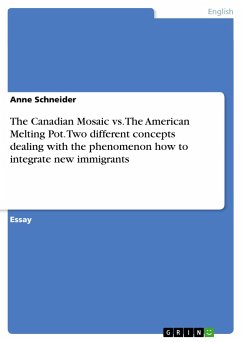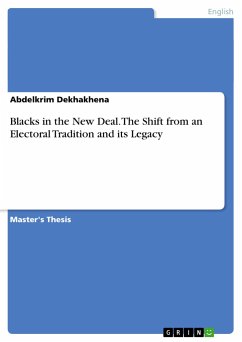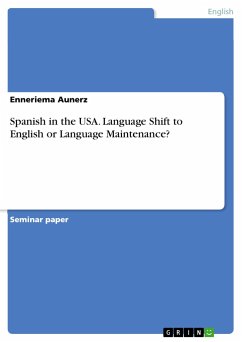
Canadian foreign policy after the Westminster Statute of 1931 -The shift from British hegemon to an American one

PAYBACK Punkte
0 °P sammeln!
Seminar paper from the year 2002 in the subject American Studies - Culture and Applied Geography, grade: 2,3 (B), Ernst Moritz Arndt University of Greifswald (Anglistics/American Studies), course: The Eagle and the Beaver, language: English, abstract: AbstractThis paper deals with Canadian foreign policy, it will hereby focus on the relations of Canada with the United States and the shift from one dependency to the next: After having reached an almost entire sovereignty from Great Britain through the Statute of Westminster in 1931, an ever growing intimacy with the USA took place. Until this d...
Seminar paper from the year 2002 in the subject American Studies - Culture and Applied Geography, grade: 2,3 (B), Ernst Moritz Arndt University of Greifswald (Anglistics/American Studies), course: The Eagle and the Beaver, language: English, abstract: AbstractThis paper deals with Canadian foreign policy, it will hereby focus on the relations of Canada with the United States and the shift from one dependency to the next: After having reached an almost entire sovereignty from Great Britain through the Statute of Westminster in 1931, an ever growing intimacy with the USA took place. Until this date, the relations between Canada and other states, especially the U.S., are often described as being triangular, because any external affairs of Canada were at the same instance affairs of Great Britain, which eagerly held its thumb on the Dominion. To give an image to the development of relations and influence in the 20th century, one could picture an extremely slow moving pendulum constituting Canada, and the left and the right turning points Britain and the USA. In the lapse of time it has not yet fulfilled one whole swing. To reach the second turning point would mean to become dissolved in the U.S. or to become integrated into a new American state. Several questions in the Canadian-American relations since 1931 are striking, and these are to be discussed within this paper. Among the most interesting is the question, in what way the American agenda has developed after 1931- was there a shift towards continental integration that could be viewed as leading to the 1994 NAFTA? And, in direct connection to this, how are the chances of an independent Canadian State in the long run? The goal will be to extract from history, if the integration of North American States can be seen as a process of continuity that has not just started in 1994, or if this is a new beginning in Canadian foreign policy. The paper argues that despite some regularly upcoming waves of anti-Americanism, there can be drawn a line of continuity from even long before Britain lost its dominant status over the dominion, in which the growing cooperation and - assimilation - of Canada, especially in economic matters, are reflected and that points to an even more integrated form of cooperation in future than we witness today in the NAFTA. Still, this does not imply the unalterable finality of a common state. Further, it can be established that the time since 1931 has shown a development towards genuine sovereignty.













